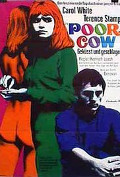
Directed by
Ken Loach
101 minutes
Rated M
Reviewed by
Bernard Hemingway

Poor Cow
Moving on from the more conventionally fictionalized "kitchen sink" social conscience films of the 50s such as A Taste Of Honey, Ken Loach’s directorial debut adopted a much more realist or cinema verité approach to his story, derived from a novel by Nell Dunn, about Joy (Carol White) a young working class London woman with a weakness for no-account men.
Covering three years of her life as her abusive husband goes to jail leaving her with their child (the film opens with his birth), she takes up with one of his mates (Terence Stamp) who also ends up in jail, whereafter she turns to a string of men to make ends meet. Loach sympathetically depicts her life, often from a first person perspective, quoting from her letters in inter-titles and having her relate her thoughts in an simulated interview. White, an actress well-known from BBC television is excellent as Joy, a feckless opportunist who typically enough, accepts her lot in life with cheery resignation. Stamp, one of the faces of the 60s is a little too articulate and sensitive to convince as a criminal type, but John Bindon as the abusive husband, Tom, comes across as the real deal.
Loach, with his left leanings is very much interested in his character’s social context and the film is a real treat for lovers of 60s England, with many shots of everyday public life of the time, including a day at the seaside (Margate I suspect) with many of the hit songs of the time heard playing on a radio.
FYI: Malcolm McDowell in first screen appearance is briefly seen as one of Joy’s many men friends. White, the daughter of a London scrapmetal dealer made a few more films but she fell victim to alcohol and substance abuse and celebrity relationships (Warren Beatty, Frank Sinatra and Richard Burton amongst them), dying in 1991 aged 48.
Want something different?





